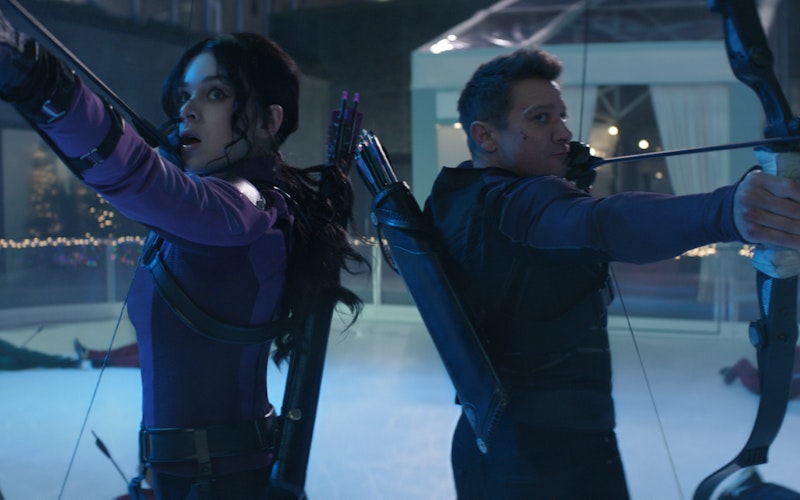
TV
Hawkeye and a Theology of Disability
Hawkeye, the latest Marvel Cinematic Universe series on Disney Plus, introduces the MCU's first official disabled superhero. In doing so, the show marks an important milestone in representation and illustrates how people with disabilities showcase the glory of God to the world.
At the start of the first episode, we find Clint Barton (Jeremy Renner) in the audience for Rogers: The Musical. The number “I Can Do This All Day” dramatizes the Battle of New York from the climax of the first Avengers film. It's a silly, catchy song-and-dance production that bears no resemblance to the awful, bloody battle that nearly claimed Clint's life over a decade ago. As dancers leap across the stage, Clint touches his ear . . . and turns off a hearing aid. The song fades and Clint sits in silence.
To be disabled is to live in a world not built for you. And so the category of “disability” calls into question the very nature of our world. What does it mean to be “able?” Who gets to decide what counts as “able” and what doesn't? Consider Maya (Alaqua Cox), an adversary in Hawkeye. While Clint is hard of hearing as a result of his heroics in earlier adventures, Maya is deaf (an important distinction). She also has an artificial leg, yet has found a way to navigate both the “able” and “disabled” worlds. Clint is learning to live in a world no longer made for him, captured in a bittersweet scene in which the new Hawkeye, Kate Bishop (Hailee Steinfeld), must help him navigate a phone call from his son.
Disability has a long, ugly history in Christian thought. Disabled persons share story after story of Christians offering poor theology to explain the existence of disability in the world. As Jill VandeZande, a minister with InterVarsity Christian Fellowship who has cerebral palsy, testifies, Christians regularly offer hurtful explanations for disabilities: that the disabled person is somehow chosen because God knew they could “handle it;” that disability is an example of original sin; or that God made a mistake. Rarely do we stop to question the powers and principalities that have defined the world such that some are outside the bounds of “ability.”
Disabled persons share story after story of Christians offering poor theology to explain the existence of disability in the world.
Into this space speak disability theologians. In reflecting on the cross, blind theologian Kelby Carlson observes, “The theology of the cross is a particular way of doing theology that disabled people can uniquely understand. . . . [Scripture] reveals a redemptive way of looking at suffering, and consequently at disability (which, for a great majority of disabled people, involves suffering to one degree or another). Grace is seen as a means of living in and through suffering. Chronic weakness is seen as real strength. In fact, it is the only way to truly approach God in faith.”
Jesus' whole earthly experience, from the manger to the cross, is evidence of God's own disability. As Nancy Eiesland writes, “Jesus Christ, as a living symbol of the disabled God, shares in the human condition; he experiences in his embodiment all our vulnerability and flaws. In emptying himself of divinity, Jesus enters the arena of human limitation, even helplessness. Jesus' own body is wounded and scarred, disfigured and distorted." (It's appropriate that Hawkeye, a show that highlights disability in a positive way, takes place at Christmastime, when we celebrate God's own disability in the Incarnation.)
Disabled persons challenge the belief that achievement or ability define wholeness. Disabled persons challenge the belief that health, strength, and happiness are markers of divine favor. Rather, they embody Paul's observation that we exist wholly by God's grace, which is made complete not in strength, but in weakness.
In Hawkeye, Maya’s weakness is not her disability. Rather, it’s her single-minded focus on vengeance that keeps her from being able to see through the lies of those close to her. Similarly, Clint has no superpowers—a point made repeatedly throughout the MCU. What makes him a hero is not his strength. It's his vulnerability. We see this vulnerability in his love for his family. We also see it when Kate asks him to name the “best shot” in his career. He responds, “The one I didn't take,” referencing the day he met Natasha Romanov, the Russian-assassin-turned-Avenger who became his best friend. By not killing her, by trusting his heart and allowing her to live, Clint made space for Natasha to find redemption—and eventually save half the universe. (This same vulnerability makes a big difference for Clint in the series' final episode.)
Watching Rogers: The Musical, Clint can only express disbelief that everyone is “singing and dancing about everything.” He recognizes nothing of real heroism in the production; there's no room for disability on the sanitized Broadway stage. Too often, our churches look more like a theatrical display than the gritty work of real heroism. But we don't find Jesus under the stage lights. We find him in the streets, among the weak and vulnerable. Rather than looking for Jesus among the megachurch pastors, conference speakers, and influencers—those we’ve built our world to celebrate—perhaps we should seek him among those who have been forced to the margins by the world we’ve built.
Topics: TV